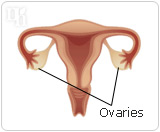As the transition to menopause begins, often do its common symptoms - hot flashes, fatigue, mood swings, vaginal dryness, and night sweats. Gradually estrogen levels drop, but what role does progesterone have during menopause?
Read on to find more information about the effect of alcohol on progesterone levels within menopausal women.
What Is Progesterone?

Progesterone is a female hormone produced by the ovaries. It has several roles within a woman's body which include preparing the uterus lining for fertilization. Within premenopausal women, progesterone plays a vital part in menstruation. If fertilization does not occur, progesterone levels drop and menstruation begins. Click here to read more information about progesterone or continue reading below to learn about how it affects menopause.
How Does Progesterone Affect Menopause?
Excessive amounts of progesterone can cause fatigue and even sedation. For women suffering from uterine irritability, this side effect can be beneficial because high doses can decrease uterine contractions. Low levels of progesterone can cause insomnia, dizziness, irritability, extreme changes in mood, weight gain, joint pain, and urinary incontinence.
During perimenopause, some women begin experiencing the symptoms of low levels of progesterone which can have drastic effects on mood. This may lead to feelings of hopelessness and depression. In addition, estrogen levels begin to drop, resulting in menopausal symptoms such as hot flashes, fatigue, and night sweats.
Progesterone may cause vaginal dryness by counteracting the effect on lubrication of estrogens and decreasing the amount of menstruation. It can also block it entirely by reversing the effects of estrogen on uterine lining growth.
Did You Know?
Symptoms of low progesterone include:

- Irritability
- Weight gain
- Mood swings
- Urinary incontinence
- Vaginal dryness
- Joint pain
- Hot flashes
- Muscle pain
For women receiving estrogen replacement therapy during menopause, progesterone is often used in conjunction to help prevent overgrowth in the uterine lining.
How Does Alcohol Affect Progesterone Levels?
Heavy alcohol consumption is associated with menstrual irregularities, which include anovulation (ovulation does not occur during menstrual cycle), recurrent amenorrhea (absence of regular period), and early menopause. Moderate to heavy alcohol intake has been found to increase risk of breast cancer and spontaneous abortions. With alcohol intake, progesterone acts to impair mental stimulation, decreasing alertness.
It is always advisable to consult a doctor or healthcare professional when seeking progesterone therapy. Click here to find out about treatments for progesterone imbalance.
